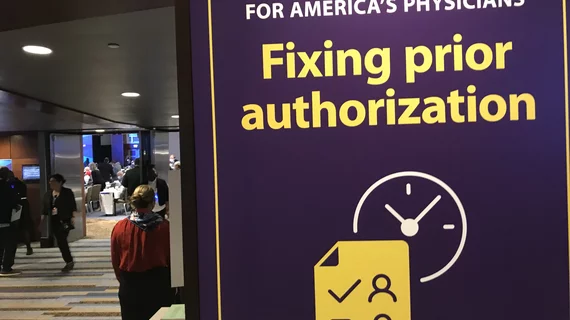CMS to streamline prior authorization process that has plagued radiology
The Centers for Medicare & Medicaid Services released a final rule on Wednesday aimed at streamlining the prior authorization process that has plagued radiology.
Under the rule, CMS will require health plans to issue decisions on whether a service is covered within 72 hours for urgent requests and seven days for other standard claims. Beginning in 2026, the agency also will mandate that payers provide a specific reason for denying a prior authorization request. CMS additionally will require insurers to publicly report metrics on their denial of coverage for imaging and other services.
“CMS is committed to breaking down barriers in the healthcare system to make it easier for doctors and nurses to provide the care that people need to stay healthy,” Administrator Chiquita Brooks-LaSure said in a Jan. 17 announcement. “Increasing efficiency and enabling healthcare data to flow freely and securely between patients, providers, and payers and streamlining prior authorization processes supports better health outcomes and a better healthcare experience for all.”
Prior authorization is commonly used to control healthcare utilization and limit waste, but it is prone to abuse. One recent survey by the American Medical Association found that 89% of providers polled believe that the tactic has had a negative impact on patient care. Radiologists face the heaviest burden from prior authorization, behind only peers in radiation oncology and cardiology, a JAMA Health Forum analysis found. Lawmakers and doc groups such as the AMA have pushed CMS to address prior authorization leading up to the final rule. Meanwhile, payers including UnitedHealthcare have already adjusted their policies in the face of this pressure.
The American Hospital Association, AMA and others praised the final rule on Wednesday.
“With prior authorization continuously ranking as the most burdensome regulatory issue facing medical groups, MGMA supports today’s action by CMS to finalize its proposals to streamline and standardize the process,” Anders Gilberg, senior VP of government affairs at the Medical Group Management Association, which represents over 15,000 physician groups across radiology and other specialties, said in a statement. “The increased transparency provisions—requiring health plans to provide clarity on the reasoning behind care denials and to publicly report aggregated metrics about their prior authorization programs annually—will help shine a light on the egregious abuse of prior authorization by payers under the guise of looking out for patients’ best interests.”
The rule applies to Medicare Advantage providers, state Medicaid and Children’s Health Insurance Programs, managed Medicaid and CHIP entities, and qualified health plan issuers on the exchange. It covers a slew of other changes also pertaining to health information exchange and PA. The American College of Radiology released a breakdown of the CMS Interoperability and Prior Authorization Final Rule Wednesday while the agency also issued a detailed fact sheet.

